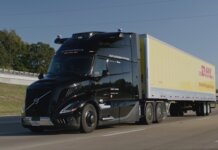After the passage of a recent Senate bill, the California legislature is now exploring the benefits of linking autonomy and electrification for advanced modes of transportation.
S.B.802, authored by California State Sen. Nancy Skinner, D-Berkeley, received bipartisan support and passed the Senate floor with a vote of 26-11 last month, setting up a process to prepare California for the adoption of autonomous vehicles and the growth of ride sharing by establishing the Emerging Vehicle Advisory Study Group.
This inter-agency working group – headed by the Governor’s Office of Planning and Research – aims to ensure that as ride sharing and autonomous vehicle use expands, these strategies support California’s air quality, carbon reduction, traffic congestion and sustainable community goals.
“Transportation is the single-largest emitter of greenhouse gases in California – accounting for over one-third of the state’s overall emissions,” says Skinner. “To reach our emissions reduction goals, we need to be strategic as we deploy new vehicles and new transportation modes.”
Research indicates that autonomous vehicles have great potential for slashing greenhouse-gas emissions, but they could also increase emissions substantially depending on how the technology is deployed.
According to studies by the Institute of Transportation Studies at UC Davis, autonomous vehicles could either reduce vehicle emissions by 90% or double emissions in the same time frame. The study states that in order to attain such large pollution reductions, autonomous vehicles will need to be zero-emission, programmed to increase fuel efficiency, and largely operated as “share vehicles.”
“Self-driving cars and ride sharing are poised to transform transportation,” says Skinner. “With potentially millions of autonomous and rideshare vehicles expected, these cars can either launch us to a clean transportation future or set us back.”
According to the bill text, on or before April 1, 2019, the Emerging Vehicle Advisory Study Group is expected to “offer recommendations to the legislature regarding policies and incentives to maximize the social benefits, minimize the social costs, and encourage the electrification and hybridization of new types of motor vehicles operating in California, including, but not limited to, autonomous vehicles and shared-use vehicles.”
“These recommendations shall include recommendations regarding updates to statewide infrastructure planning efforts, including recommendations to reduce traffic congestion and identification of any other state barriers to short- and long-term adoption of new types of motor vehicles by the public and private sectors,” the text states.
Upon the passage of S.B.802, Bonnie Holmes-Gen, senior director for air quality and climate change for the American Lung Association in California, says, “Ninety percent of Californians live in areas that experience unhealthy air, mostly due to transportation pollution. We need to ensure that technological advances protect our public health and our climate from transportation pollution.”
S.B.802 will now be heard in the Assembly.






